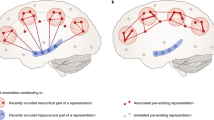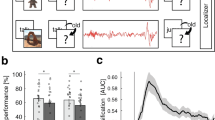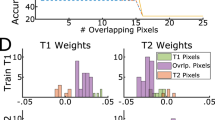Abstract
Crick and Mitchison1 have presented a hypothesis for the functional role of dream sleep involving an ‘unlearning’ process. We have independently carried out mathematical and computer modelling of learning and ‘unlearning’ in a collective neural network of 30–1,000 neurones. The model network has a content-addressable memory or ‘associative memory’ which allows it to learn and store many memories. A particular memory can be evoked in its entirety when the network is stimulated by any adequate-sized subpart of the information of that memory2. But different memories of the same size are not equally easy to recall. Also, when memories are learned, spurious memories are also created and can also be evoked. Applying an ‘unlearning’ process, similar to the learning processes but with a reversed sign and starting from a noise input, enhances the performance of the network in accessing real memories and in minimizing spurious ones. Although our model was not motivated by higher nervous function, our system displays behaviours which are strikingly parallel to those needed for the hypothesized role of ‘unlearning’ in rapid eye movement (REM) sleep.
This is a preview of subscription content, access via your institution
Access options
Subscribe to this journal
Receive 51 print issues and online access
$199.00 per year
only $3.90 per issue
Buy this article
- Purchase on Springer Link
- Instant access to full article PDF
Prices may be subject to local taxes which are calculated during checkout
Similar content being viewed by others
References
Crick, F. C. & Mitchison, G. Nature 304, 111–114 (1983).
Hopfield, J. J. Proc. natn. Acad. Sci. U.S.A. 79, 2554–2558 (1982).
Author information
Authors and Affiliations
Rights and permissions
About this article
Cite this article
Hopfield, J., Feinstein, D. & Palmer, R. ‘Unlearning’ has a stabilizing effect in collective memories. Nature 304, 158–159 (1983). https://doi.org/10.1038/304158a0
Received:
Accepted:
Issue Date:
DOI: https://doi.org/10.1038/304158a0
This article is cited by
-
The physics of energy-based models
Quantum Machine Intelligence (2022)
-
Quantum pattern recognition with multi-neuron interactions
Quantum Information Processing (2018)
-
REM sleep selectively prunes and maintains new synapses in development and learning
Nature Neuroscience (2017)
Comments
By submitting a comment you agree to abide by our Terms and Community Guidelines. If you find something abusive or that does not comply with our terms or guidelines please flag it as inappropriate.



